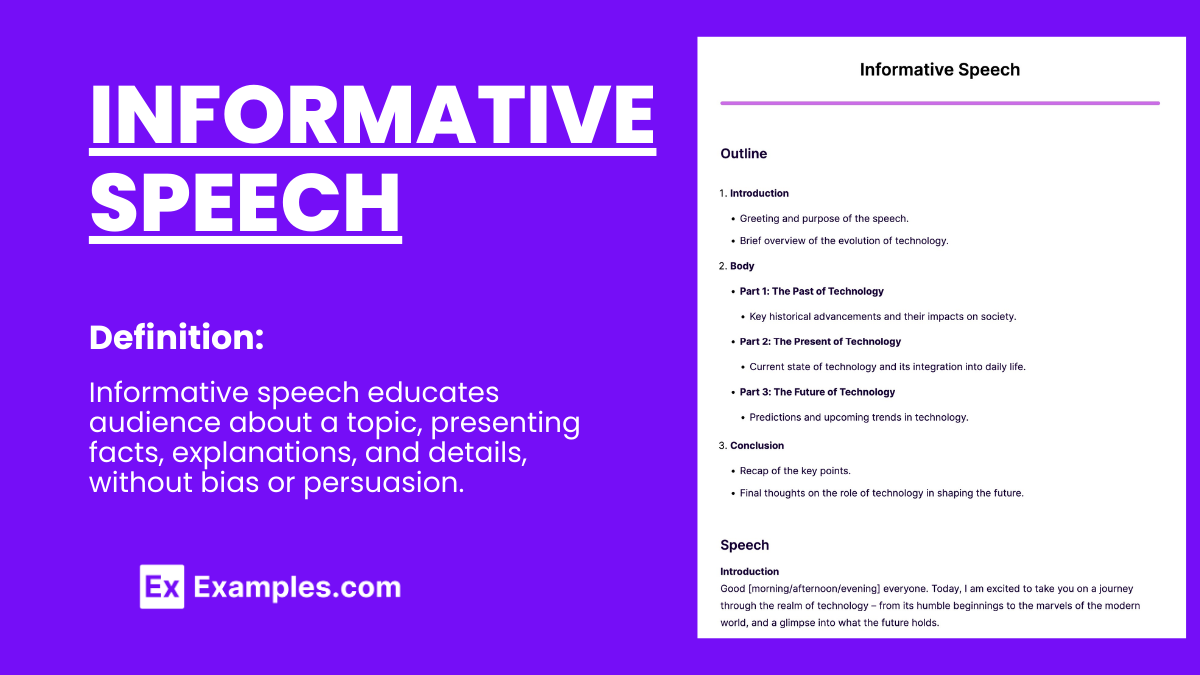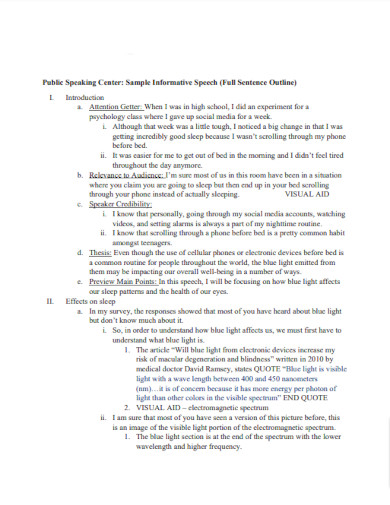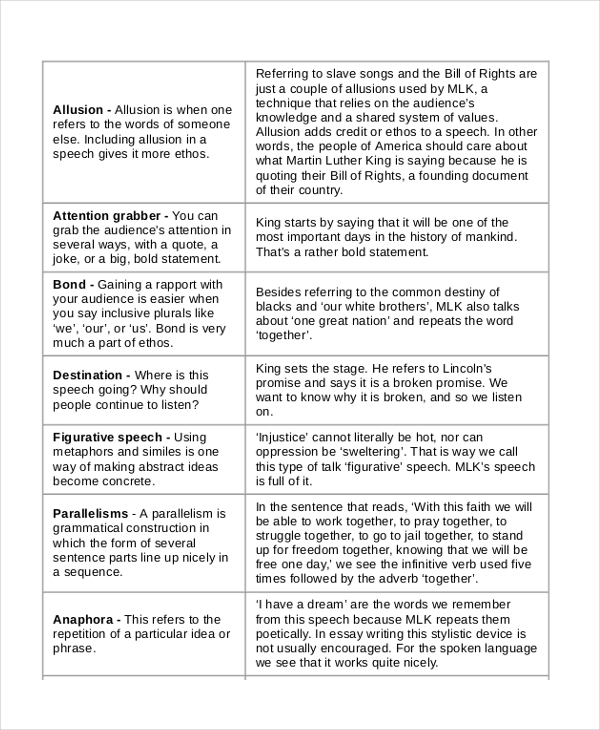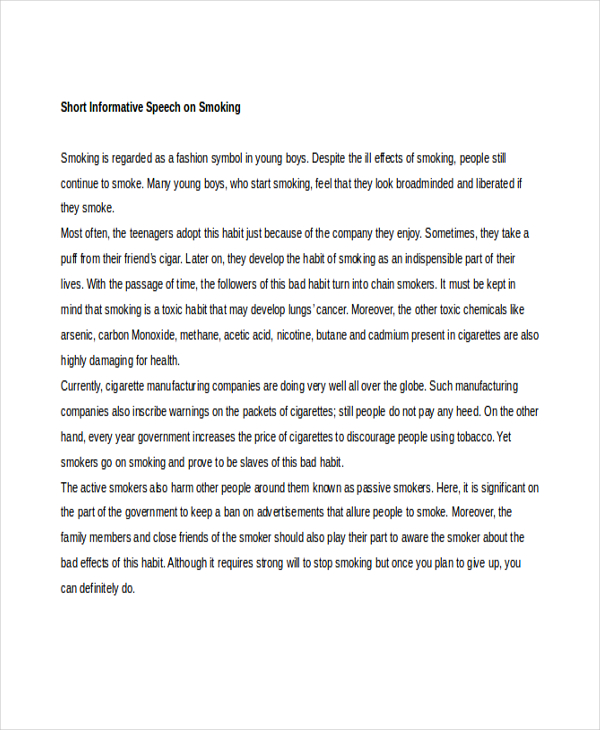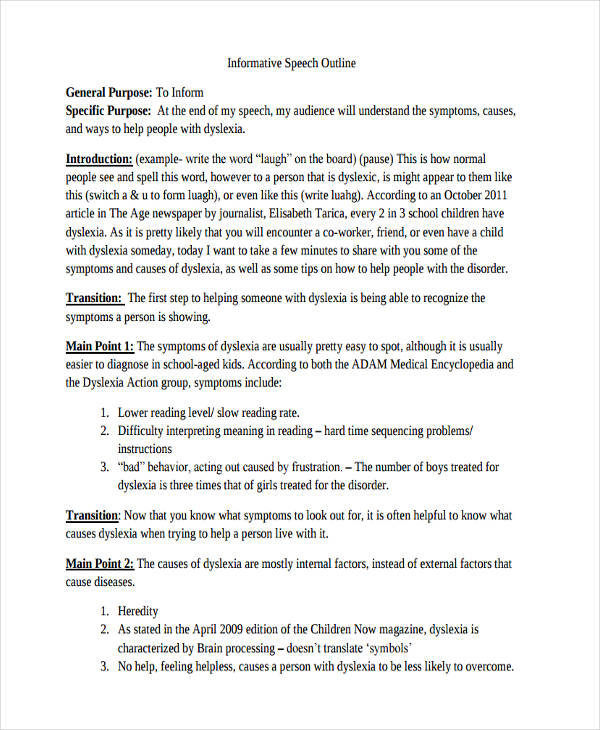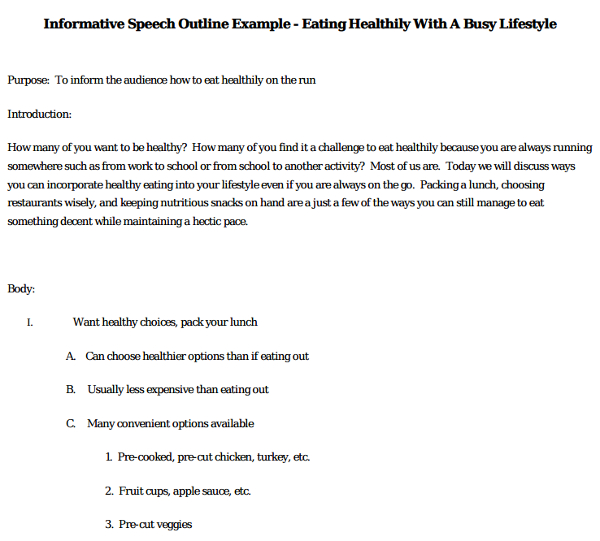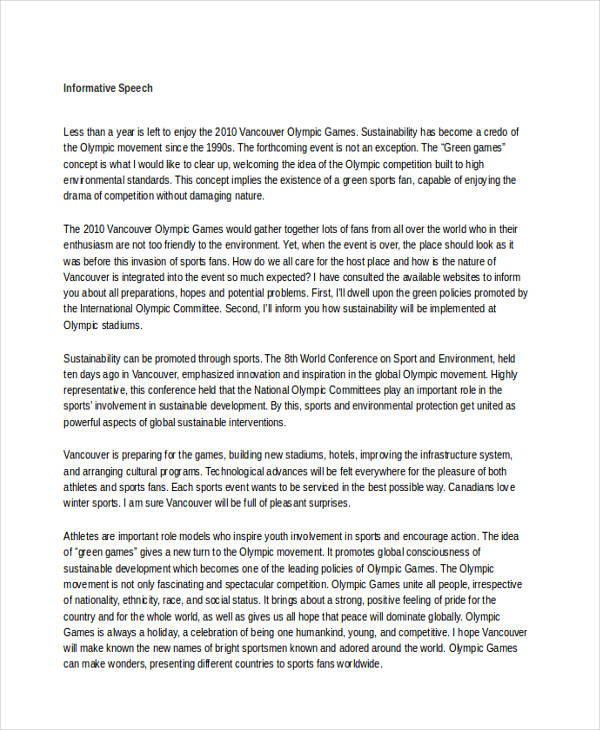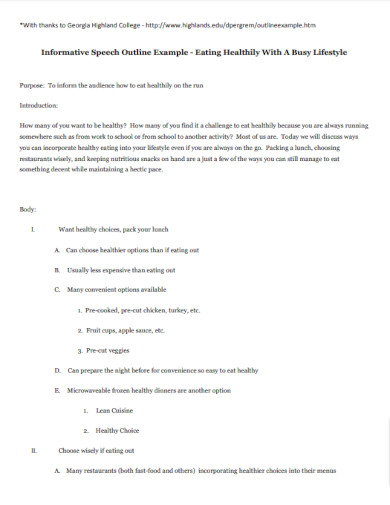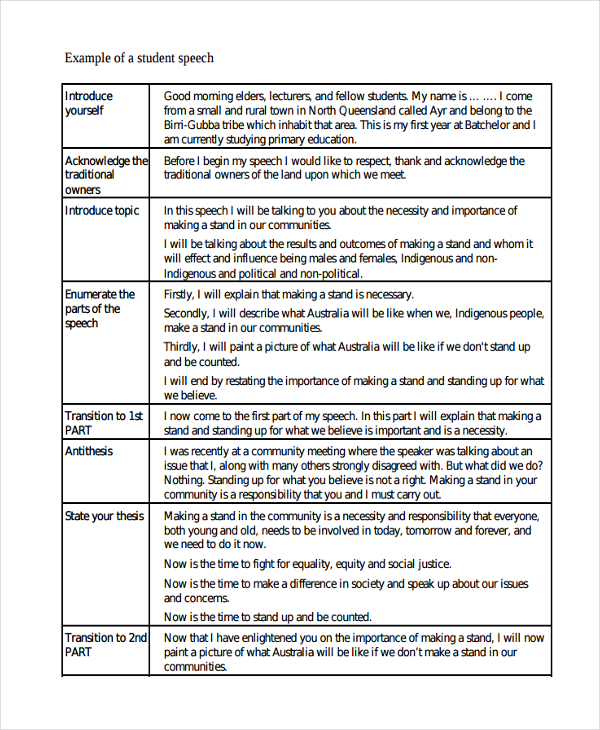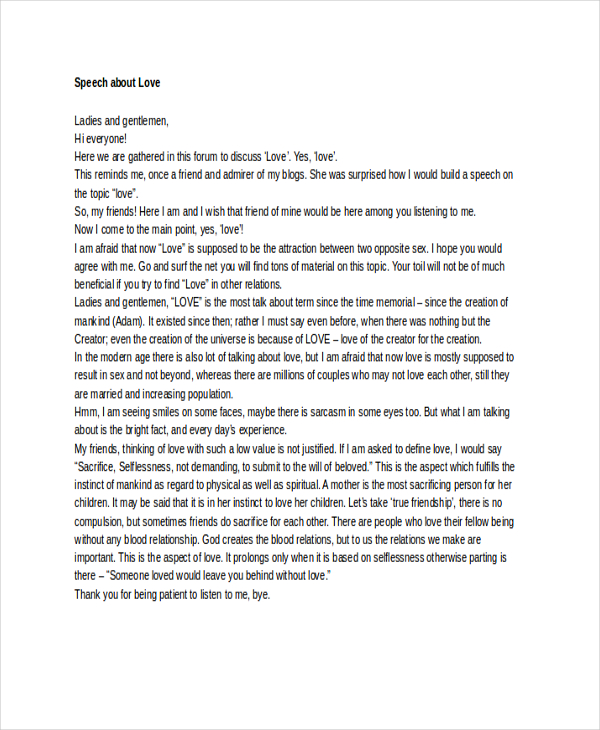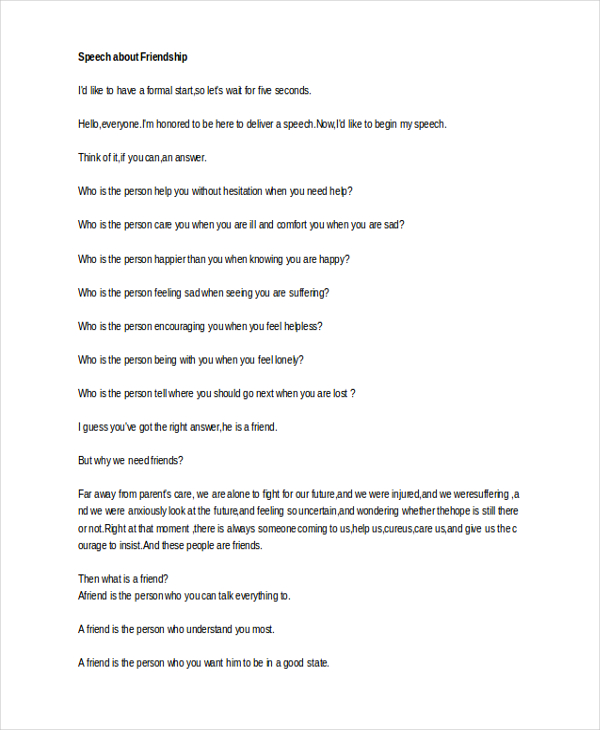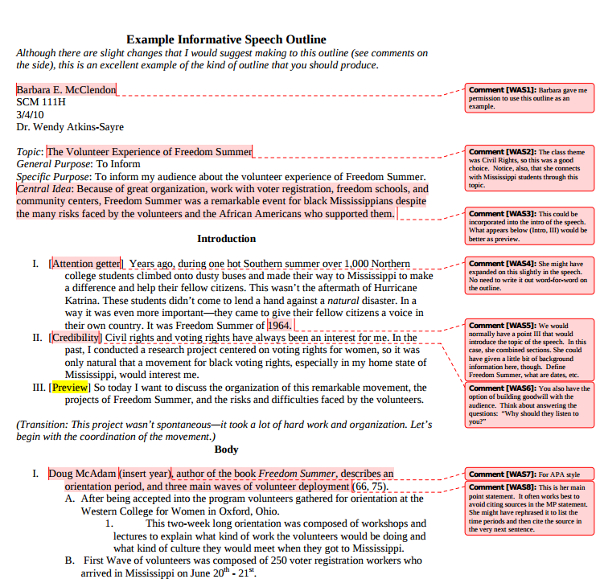35+ Informative Speech Examples
As a speaker, you’re given a special role. You’ve been given the power for your voice to be heard. For those who deliver an informative speech, this role can come as a challenge. Not only do you have to write a speech, but you also need to deliver it well. Of course, there’s also the challenge of making your speech interesting enough to capture the attention of your audience.
What Is an Informative Speech?
An informative speech is a type of speech designed to educate the audience on a particular topic. It aims to provide interesting and useful information, ensuring the audience gains new knowledge or insights. Unlike persuasive speeches that seek to convince the audience of a particular viewpoint, informative speeches focus on explaining a subject matter clearly and objectively, without trying to influence the audience’s opinions or beliefs.
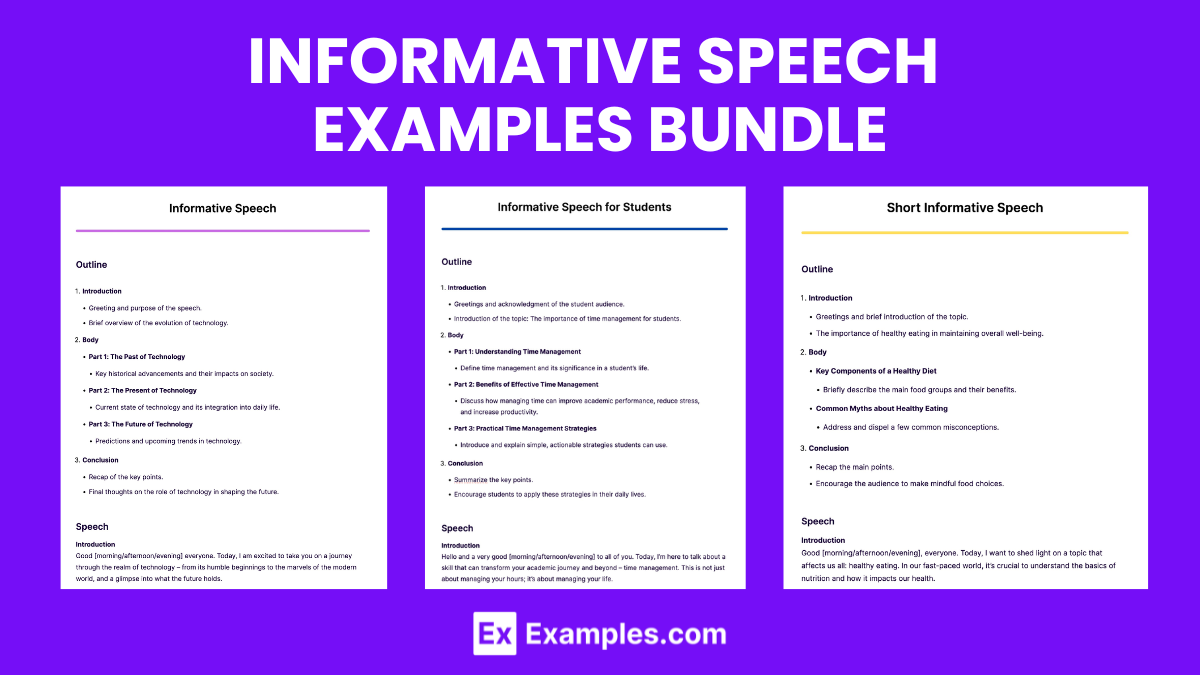
Download Informative Speech Bundle
An informative speech must be made memorable for it to be effective. Check out these examples and outlines of speeches that have tried to do just that. If they succeeded or failed, you’ll be the judge of that. Take what works and replicate it in your own speech drafts.
Informative Speech Format
Introduction
- Attention Getter: Start with a hook to grab the audience’s attention. This could be a surprising fact, an intriguing question, or a relevant story.
- Purpose Statement: Clearly state the purpose of your speech. This tells the audience exactly what they will learn.
- Preview: Briefly outline the main points you will cover. This gives the audience a roadmap of your speech.
Body
- First Main Point: Introduce your first key point. Support this point with evidence, such as data, examples, or expert quotes. Explain how this information is relevant to your topic.
- Second Main Point: Follow the same format as the first point, presenting new information and supporting evidence.
- Third Main Point: Continue with the format, ensuring each point is distinct and contributes to your overall topic. Remember to transition smoothly between points to maintain the flow of your speech.
Conclusion
- Summary: Briefly recap the main points you’ve covered. This reinforces the information for the audience.
- Closing Statement: Conclude with a strong closing statement. You can reiterate the importance of the topic, share a concluding thought, or call to action if relevant.
Example of Informative Speech
The Impact of Technology on Society
Good morning, everyone. Today, I am excited to delve into a topic that affects us all profoundly: the impact of technology on society. From the way we communicate to how we work and learn, technology has transformed every facet of our lives. But what does this mean for us as a society? Let’s explore this together.
Imagine a world without smartphones, social media, or the internet. It’s hard, isn’t it? These technologies have become so integral to our daily lives that living without them seems almost unthinkable.
My aim today is to shed light on both the positive and negative effects of technological advancements on our societal structures, behaviors, and relationships. We will explore three main areas: communication, privacy, and education.
Technology has revolutionized the way we communicate. Social media platforms have made it easier than ever to stay connected with loved ones around the globe. While this keeps relationships alive across distances, it also raises questions about the depth and quality of these connections.
The digital age has brought about significant concerns regarding privacy. Personal information is often collected by companies for targeted advertising, sometimes without explicit consent. This practice has led to a global conversation about the rights to privacy and the need for stricter regulations to protect personal information.
Technology has transformed the educational landscape. Online learning platforms and digital textbooks make education more accessible than ever. However, this shift also presents challenges, such as the digital divide, where not all students have equal access to technology.
In conclusion, technology’s impact on society is multifaceted, influencing our communication, privacy, and education. While it offers unprecedented opportunities for growth and connectivity, it also presents significant challenges that we must address.
As we navigate this digital age, let us embrace the benefits of technology while also being mindful of its implications. By doing so, we can ensure that technological advancements serve to enhance, rather than diminish, the quality of our societal fabric.
Thank you for your attention, and I look forward to any questions you might have.
Good Topics for Informative Speech with Samples
- Climate Change: Discuss the causes, effects, and solutions related to climate change.
- Artificial Intelligence: Explore the impact of AI on various industries and daily life.
- Space Exploration: Cover recent advancements in space exploration and missions to other planets.
- Cybersecurity: Explain the importance of cybersecurity and how individuals can protect their online privacy.
- Mental Health Awareness: Discuss common mental health issues and strategies for maintaining mental well-being.
- History of a Notable Figure: Present a biography of a historical figure and their contributions.
- Healthy Eating Habits: Share tips for maintaining a healthy diet and lifestyle.
- Renewable Energy Sources: Explain different types of renewable energy and their benefits.
- The Impact of Social Media: Discuss the positive and negative effects of social media on society.
- The Importance of Education: Explain the significance of education in personal and societal development.
- Cultural Diversity: Explore the value of cultural diversity and its impact on societies.
- Medical Breakthroughs: Highlight recent advancements in medical science and healthcare.
- Effective Time Management: Provide strategies for better time management and productivity.
- The History of a Local Landmark: Share the history and significance of a well-known local landmark.
- The Power of Positive Thinking: Discuss the benefits of a positive mindset and its impact on success.
- Economic Trends: Explain current economic trends and their implications for businesses and individuals.
- Animal Conservation: Discuss endangered species and efforts to protect them.
- The Importance of Voting: Explain the significance of participating in the democratic process.
- DIY Home Improvement: Offer tips and tricks for various home improvement projects.
- The Art of Public Speaking: Provide insights into effective public speaking techniques.
Examples of Informative Speeches
- Technological Advancements in Renewable Energy (Environment)
- The Evolution of Artificial Intelligence in Healthcare (Technology)
- The Influence of Cryptocurrency on Global Finance (Economics)
- Conservation Efforts for Endangered Species (Ecology)
- The History and Cultural Impact of Hip Hop Music (Culture)
- The Rise of Electric Vehicles in Modern Transportation (Technology)
- Understanding the Global Water Crisis (Environmental Science)
- The Psychological Effects of Social Media on Teenagers (Psychology)
- The Development of Quantum Computing (Computer Science)
- The Role of the United Nations in Promoting Global Peace (International Relations)
Informative Speech
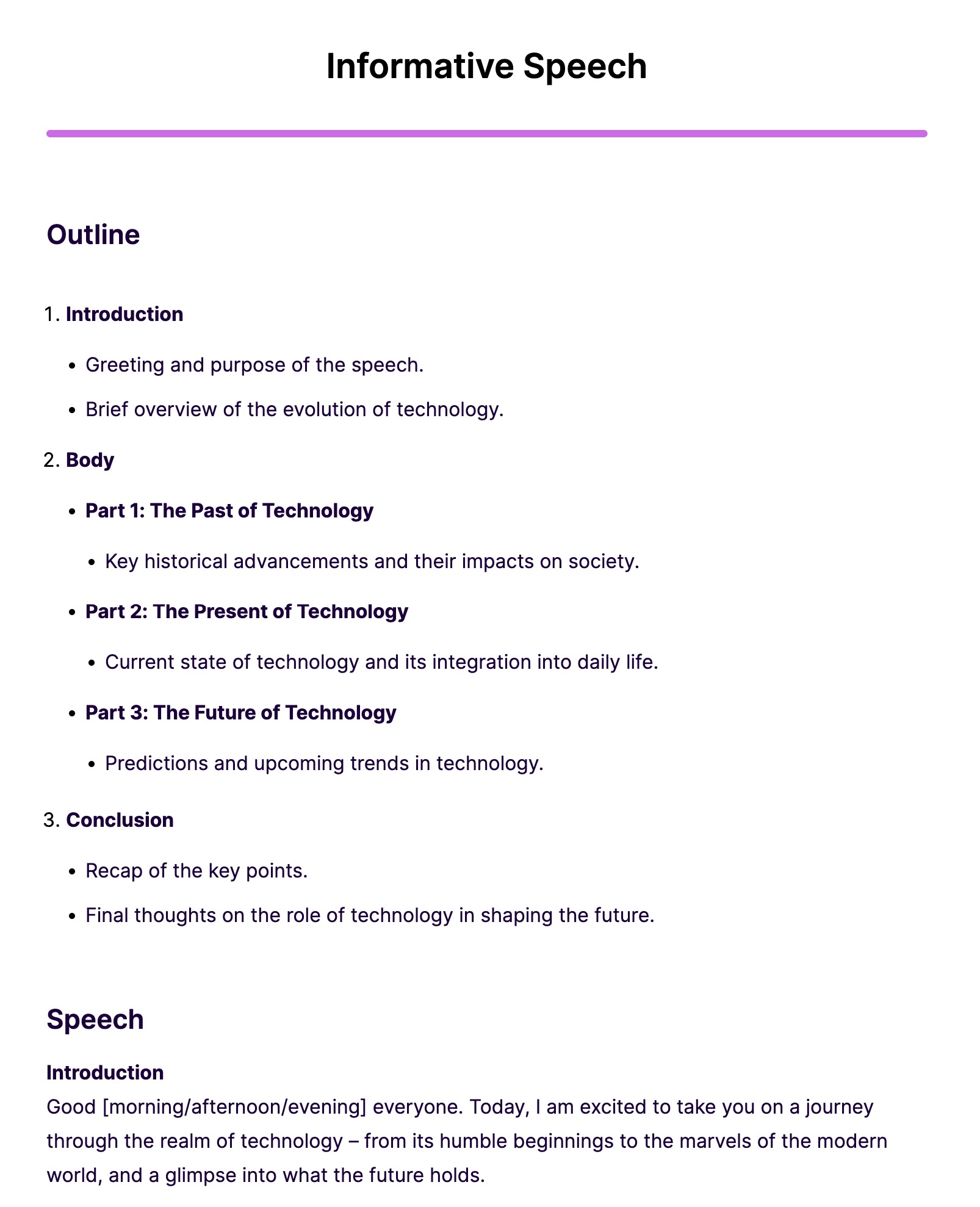
Informative Speech for Students
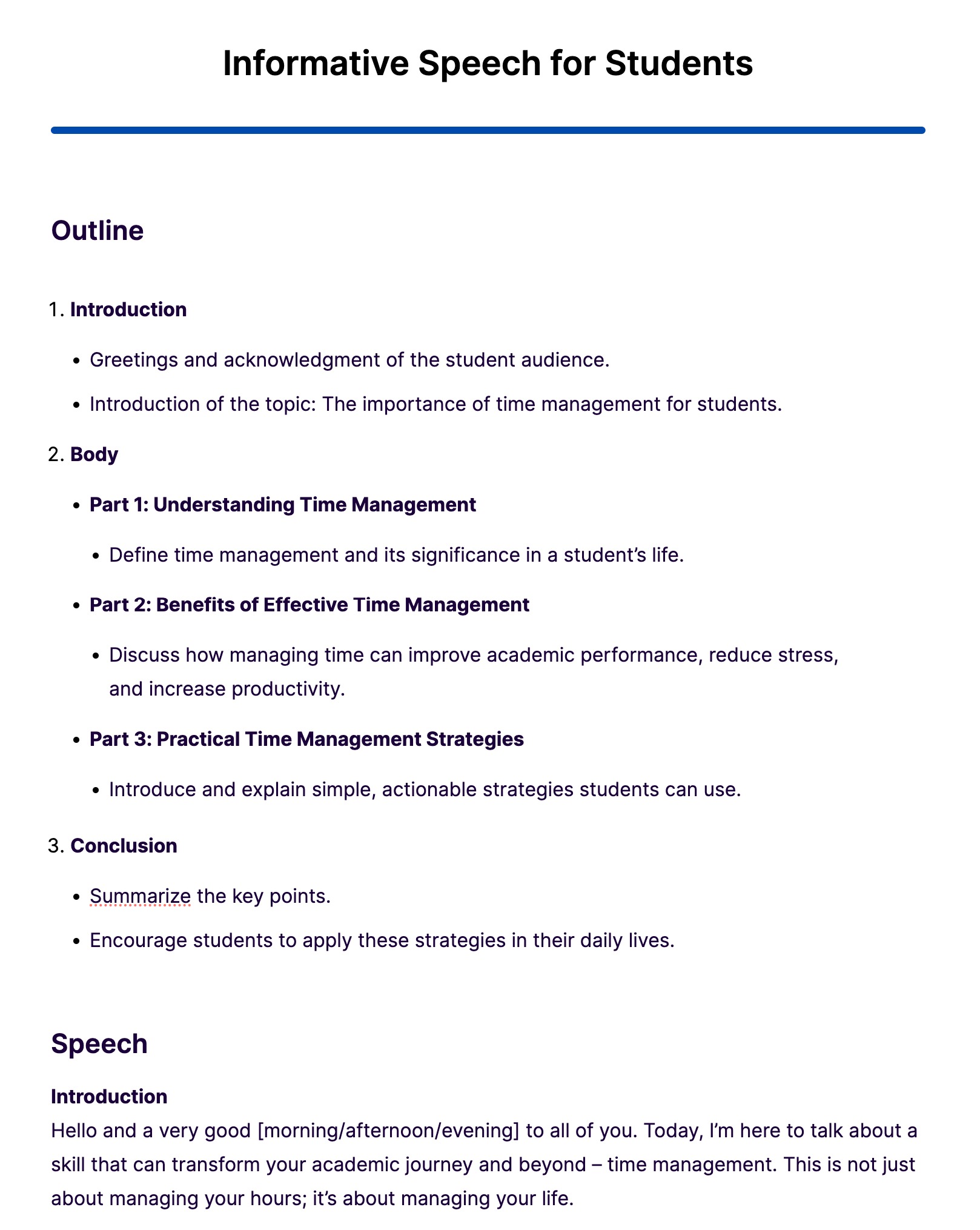
Short Informative Speech
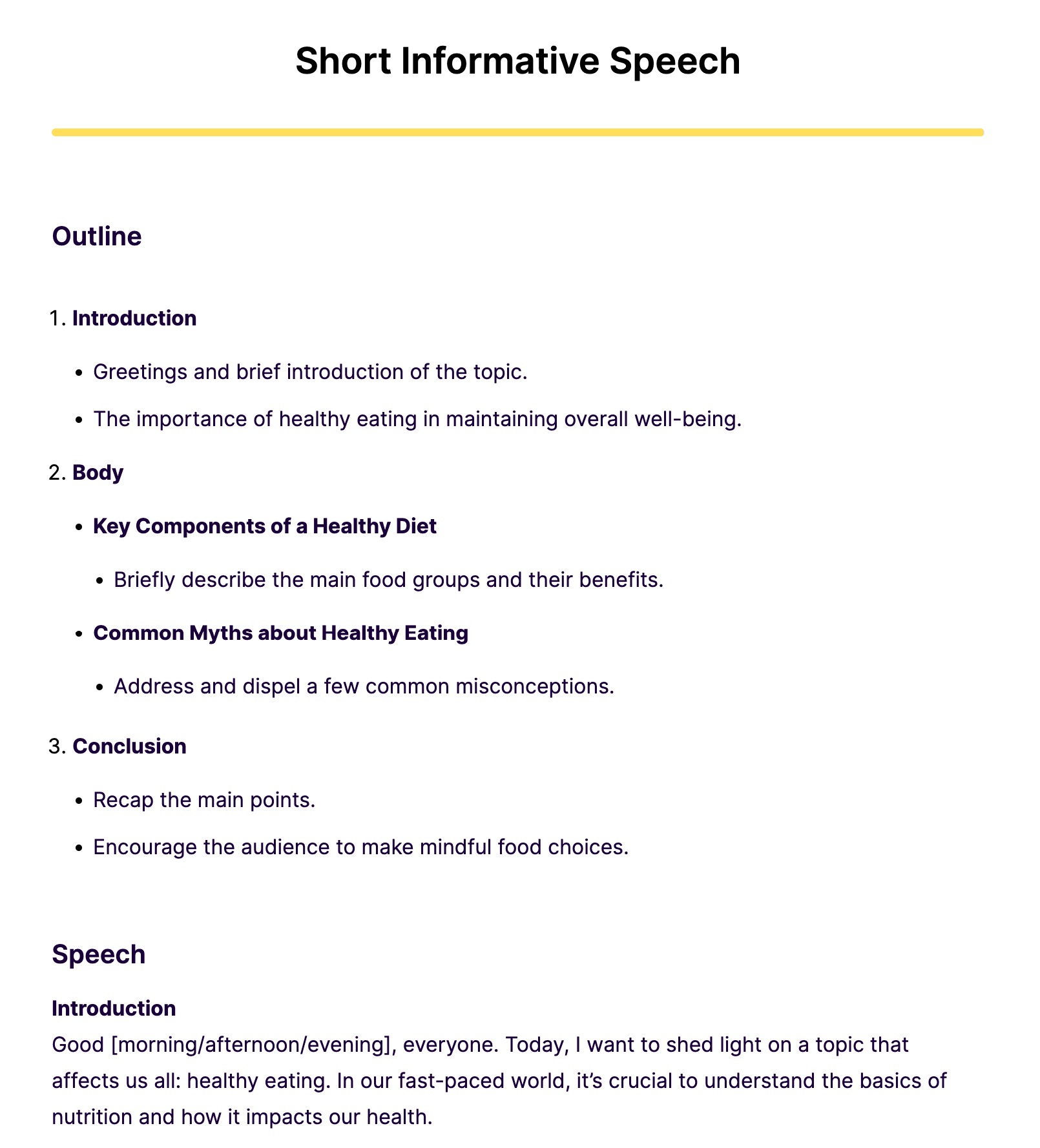
Informative Speech Examples
Literature Informative Speech Example
Short Informative Speech Example
Informative Business Speech Example
Sample Informative Speech Example
Informative Speech Outline Sample
Informative Speech Outline Example
Free Informative Speech Example
Informative Speech Example About Life
Example of a Student Informative Speech
Informative Speech about Love Example
Informative Speech about Friendship Example
Example Informative Speech Outline
Guidelines for an Effective Informative Speech
Always maintain your focus. It’s easy to swerve lanes with topics that are too broad, as there just too many areas that may be covered. So instead, identify the specific areas that you wish to tackle. You may also see tribute speech examples & samples.
Focus on these areas and provide supporting details for each.
If you wish to paint a mental picture for your audience, make your speech as detailed as possible. You can do so by describing even the tiniest detail of a given subject.
Additionally, consider your audience’s needs when crafting your speech. Make sure that it caters to their knowledge level and group. You need to be accurate, clear, and meaningful in order for your speech writing to be effective enough.
How to Create an Outline for Informative Speech
1. Before you create the actual outline for your speech, you need to decide on your topic of interest. This will help you brainstorm on key points that you would want to emphasize in your speech. You may also like dedication speech examples.
2. Next, it would be necessary to arrange these points in a certain manner. It may be in topical, spatial, or chronological order. This will help you make smooth transitions between different points.
3. Finally, conclude your speech. Since you aren’t meant to provide a call of action for this type of speech, simply summarize the main points.
Remember, your speech outline isn’t your whole speech but it will serve as a draft to guide you with your final speech.
Why Is an Informative Speech Important?
An informative speech is an essential part of learning, especially if you want to share your knowledge on a given matter or even spread awareness to the public. An effective informative speech provides an audience with information that are significant, yet uncommon.
Listeners wouldn’t want to hear about things that they already know, it’s the speaker’s job to expand the knowledge of an audience. At the end of the day, this ideal of educating a public proves to be beneficial for both the speaker and the audience. You may also check out orientation speech examples & samples.
What is Informative Writing Speech?
Informative writing and informative speech both aim to provide valuable information to an audience, but they differ in their presentation formats. Informative writing refers to the act of conveying information through written text, while an informative speech is the oral presentation of information to an audience. Here’s a brief explanation of each:
Informative Writing: Informative writing is a form of writing that is designed to educate or inform readers about a specific topic. It typically presents factual information, explains concepts, or provides an analysis of a subject. Informative writing can take many forms, including essays, articles, reports, research papers, blogs, and more. The primary goal is to convey information clearly and concisely to the reader. It often includes supporting evidence, examples, and details to enhance the reader’s understanding of the topic.
Informative Speech: An informative speech, on the other hand, is an oral presentation delivered to an audience with the purpose of conveying information, facts, or insights about a particular topic. It is a spoken form of communication that allows the speaker to engage with the audience in real-time. An informative speech typically follows a structured format, with an introduction, body, and conclusion. The speaker’s goal is to educate the audience, and the speech may include visual aids or props to enhance comprehension.
Types of Informative Speech
- Descriptive Speeches – These speeches aim to provide a detailed description of a subject, allowing the audience to form a clear mental image.
- Explanatory Speeches – Focused on explaining the reasons behind phenomena or processes, offering a deeper understanding of how and why things happen.
- Demonstrative Speeches – These are how-to speeches that guide the audience through the steps of doing something, emphasizing practical skills and techniques.
- Definition Speeches – Aim to clarify the meaning, background, and context of a particular term or concept, especially complex or abstract ones.
- Informative Report Speeches – Present factual reports on specific events, findings, or research, providing detailed information and analysis.
- Comparative Speeches – Discuss the similarities and differences between two or more entities, offering insights into their unique characteristics and relationships.
- Biographical Speeches – Focus on the life and achievements of a person, providing a detailed account of their contributions, experiences, and legacy.
- Historical Speeches – Offer a detailed examination of past events, including their causes, effects, and significance in history.
- Technical Speeches – Deal with complex technical information, aiming to make specialized knowledge accessible and understandable to the audience.
- Scientific Speeches – Present scientific concepts, discoveries, or research findings, emphasizing the methodology, results, and implications of scientific studies.
What are examples of informative writing?
- News Articles: News reports provide information about current events, often answering the who, what, when, where, and why questions.
- Expository Essays: These essays present information, facts, and explanations about a specific topic or subject.
- Research Papers: Academic papers that provide in-depth information and analysis on a particular subject or research question.
- How-to Guides: Instructions on how to perform a specific task, such as cooking a recipe, assembling furniture, or using software.
- Textbooks: Educational materials that provide information on various subjects, often used in schools and colleges.
- Encyclopedias: Reference books that offer detailed information on a wide range of topics.
- User Manuals: Instruction manuals that explain how to operate and troubleshoot devices, appliances, or software.
- Travel Guides: Publications that provide information about travel destinations, including attractions, accommodations, and local culture.
- Scientific Journals: Articles that report the methods, results, and conclusions of scientific research studies.
- Technical Documents: Documents that explain technical specifications, processes, or procedures in various fields, such as engineering or computer science.
- Historical Accounts: Writings that provide historical facts and analysis of past events, periods, or figures.
- Biographies: Accounts of individuals’ lives that offer information about their personal and professional experiences.
- Health and Wellness Articles: Articles that provide information on various health topics, including medical conditions, nutrition, and fitness.
- Product Reviews: Reviews that give detailed information about the features, performance, and quality of products or services.
- FAQs (Frequently Asked Questions): Lists of questions and answers that provide information about a specific topic or product.
- Documentary Narration: Narration scripts for documentaries that educate viewers on various subjects.
- Lecture Notes: Notes taken during educational lectures that summarize information presented by the lecturer.
- Financial Reports: Documents that present financial information and analysis of a company’s performance.
- Government Publications: Documents released by government agencies that provide information on laws, regulations, policies, and statistics.
- Blogs and Online Articles: Informative content published on blogs or websites covering a wide range of topics, from technology to lifestyle.
How do you write a good informative speech?
- Choose a Topic: Select a topic that interests you and is relevant to your audience. Ensure it’s not too broad or too narrow for the allotted time.
- Research: Gather reliable information from various sources, including books, articles, websites, and expert interviews. Take thorough notes.
- Organize Your Content: Introduction, Body, Conclusion
- Engage Your Audience: Use stories, anecdotes, or real-life examples to make your speech relatable.
- Practice: Rehearse your speech multiple times to become comfortable with the content and timing. Practice your delivery, tone, and gestures.
- Timing: Stay within the allotted time. Being too brief or too long can diminish the impact of your speech.
- Feedback: Seek feedback from others to improve your speech’s clarity and effectiveness.
- Delivery: When delivering the speech, maintain good eye contact with the audience, use a clear and audible voice, and control your body language.
- Q&A Session: If appropriate, be prepared for a question-and-answer session following your speech. Anticipate potential questions related to your topic.
What does a good informative speech look like?
- Clear Structure: It follows a clear and logical structure, typically consisting of an introduction, body with main points, and a conclusion. The main points are well-organized and flow seamlessly.
- Engaging Introduction: It begins with an attention-grabbing introduction, which may include a compelling anecdote, quote, rhetorical question, or startling fact. The introduction also introduces the topic and states the purpose or thesis of the speech.
- Thorough Research: It is well-researched, presenting accurate and reliable information from credible sources. The information is presented in a clear and organized manner.
- Well-Defined Main Points: The main points are distinct, well-defined, and supported with relevant evidence, examples, statistics, or anecdotes.
- Effective Transitions: The speech includes smooth transitions between main points, ensuring that the audience can follow the progression of ideas easily.
- Engagement: It engages the audience through effective storytelling, relatable examples, and a conversational tone.
- Clarity and Simplicity: It uses clear and concise language to convey complex concepts, making it understandable to a diverse audience.
- Audience Focus: The speech is tailored to the needs and interests of the audience. The speaker considers the prior knowledge and expectations of the listeners.
- Audience Interaction (if appropriate): It incorporates opportunities for the audience to engage, such as asking questions, participating in polls, or sharing their thoughts.
How do you start an informative speech?
1. Select a Clear and Engaging Opening:
Begin with an attention-grabbing opening that piques the audience’s interest. You can use a surprising fact, a rhetorical question, a relevant quote, a brief anecdote, or a compelling story. This opening should relate to your topic and set the stage for what’s to come.
2. Introduce Yourself:
After your opening, briefly introduce yourself. Share your name and any relevant qualifications or expertise that establish your credibility on the topic.
3. State the Topic and Purpose:
Clearly state the topic of your speech and its purpose. In one or two sentences, explain what you’ll be discussing and why it’s important or relevant.
4. Provide an Overview:
Offer a brief preview of the main points or subtopics you’ll cover in your speech. This gives the audience a roadmap of what to expect.
5. Establish a Connection:
Establish a connection with the audience by demonstrating the relevance of the topic to their lives or interests. Explain why they should care about the information you’re going to present.
6. Set the Tone:
Consider the tone of your speech. Depending on your topic, you may want to set a serious, informative, motivational, or humorous tone. Ensure that the tone aligns with the subject matter and the audience’s expectations.
7. Engage the Audience:
Encourage audience engagement by asking a rhetorical question or by posing a question that you’ll answer later in your speech. This can pique their curiosity and involve them from the beginning.
8. Transition to the Body:
Conclude your introduction with a smooth transition to the main body of your speech. This transition should connect the opening to the content that follows.
What not to do in an informative speech?
In an informative speech, avoid vague or biased information, complex jargon, excessive detail, disrespect, and lack of organization. Maintain clarity, engage the audience, and stay focused on the topic.
How do you write a hook for an informative speech?
To create an engaging hook for an informative speech, use a startling fact, anecdote, question, quote, or humor that captivates the audience’s interest and introduces your topic effectively.
What is an informative speech for kids?
An informative speech for kids is a presentation designed to educate young audiences about a specific topic in a simple, engaging, and age-appropriate manner, promoting understanding and learning.
Mastering the art of informative speeches is pivotal for effective communication in various settings. These speeches play a key role in educating and enlightening audiences on diverse topics, emphasizing the importance of clarity, engagement, and factual accuracy. The speaker’s ability to present information in an interesting and accessible manner can significantly enhance the audience’s understanding and retention of the subject matter.
For a deeper understanding of informative speeches, including their structure and purpose, explore the resources at Southwest Tennessee Community College’s guide on Competent Communication. Additionally, Modesto Junior College Library offers a comprehensive guide on writing and delivering informative speeches, which can be an invaluable resource for anyone looking to improve their speech-making skills.


